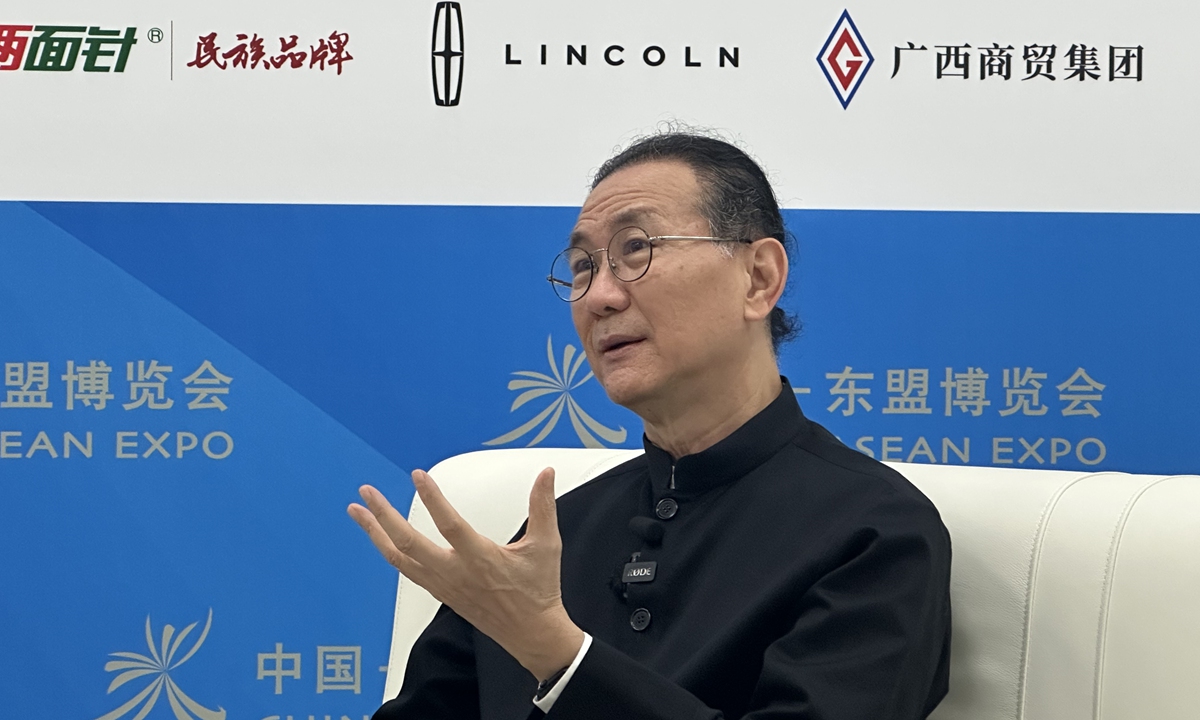
Vikrom Kromadit, chairman of the Thailand-China Business Council and CEO of Amata Corporation Photo: Shen Weiduo/GT
China can be a cooperation priority in anything to do with technology, said Vikrom Kromadit, chairman of the Thailand-China Business Council, as he noted that driven by the joint construction of the Belt and Road Initiative (BRI), cooperation potential among China, Thailand and ASEAN will be further released.
"We can go further together," Kromadit told the Global Times in an interview on the sidelines of the ongoing 20th China-ASEAN expo in Nanning, South China's Guangxi Autonomous Region. This year marks the 20th anniversary of the expo.
The expo is a very good platform for entrepreneurs from ASEAN and China to build relationships. These relationships are all about economic development and learning how to cooperate, Kromadit noted.
The entrepreneur noted that China and ASEAN have had "very successful" cooperation in the past decades, but there is room for further growth.
In terms of total land area and population, the ASEAN member countries are about half the scale of China, but their total economic volume is only about one-fifth of China's. This means that there is still a lot of room for economic and trade cooperation, he explained.
Moreover, the China-Laos railway has been put into operation and the China-Thailand railway is scheduled to be completed in three years. Trains from Kunming may even go directly to Singapore in the future. "Whether it is by road, air or rail, exchanges between China and ASEAN countries will be more convenient and smoother, so I do believe that total trade between China and ASEAN will grow more and more."
Official data show that China has been ASEAN's largest trading partner for 14 consecutive years, and the two sides have been each other's largest trading partners for three consecutive years. In 2022, China-ASEAN trade exceeded $970 billion, a year-on-year increase of 11.2 percent.
When asked about whether the current geopolitical context will affect economic and trade cooperation between China and ASEAN, Kromadit said that China and ASEAN are like a family.
"I saw that from day one, China always treated us like a family, and ASEAN is also working with China as our partner."
If there is any hint of trouble, China and ASEAN members always sit down and communicate face-to-face, he said, adding that relations will continue to grow.
Kromadit is also the founder and chief executive officer of Amata Corp - Thailand's biggest industrial-park developer - and a witness to China's development in recent decades.
In 2006, Amata cooperated with China Holley Group to develop the Thai-Chinese Rayong Industrial Zone, one of the first Chinese overseas industrial sites. Nearly half of Chinese manufacturing companies' investments in Thailand are located there.
As a close follower of China, Kromadit expressed his confidence in the prospects of China's economy, saying that it is healthy despite some temporary challenges, debunking the "China collapse" hype.
China's social stability, economic sustainability and the fact that 1.4 billion people can work hard for the same development goals are an "unbelievable" combination, Kromadit said, noting that the Chinese government's system and policies, as well as Chinese people's hardworking spirit and their ambitions to make their businesses grow - a mix that is hard to find in other countries - will support its development.
As to further investment opportunities in China, Kromadit said, "Anything called 'technology', anything about costs and anything that can be exported, China always gets first priority… and gets more advantages than anywhere."




